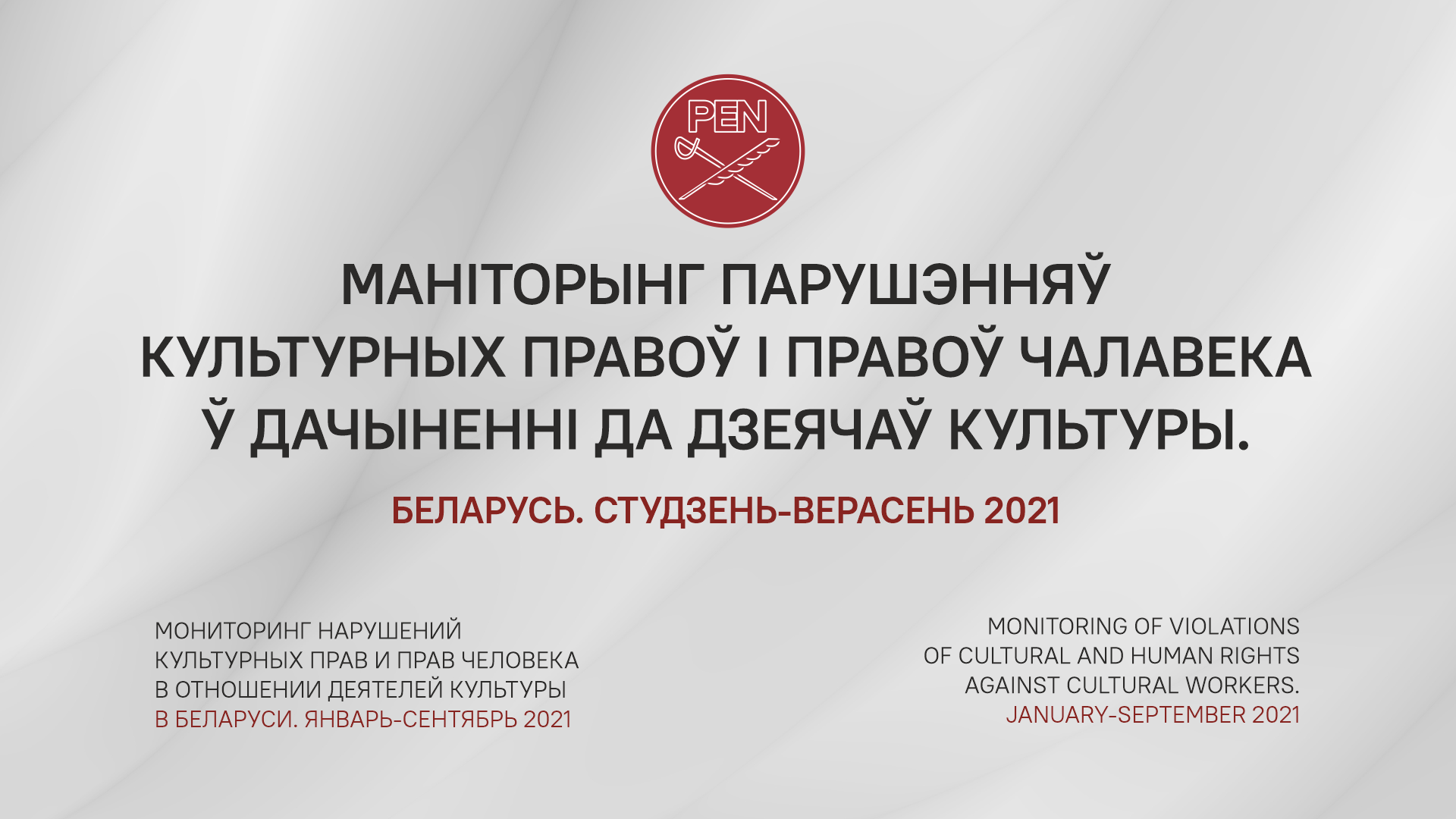
“The main cultural news right now is: emmigration, the liquidation of cultural organizations, trials, and arrests. “
Maksim Žbankoŭ, journalist and culture expert
PEN Belarus is systematically collecting information on the implementation of cultural rights and the observance of the rights of cultural workers. Since August 2020, we have been both witnesses and recorders of the extreme pressure exerted upon Belarusian civil society, and cultural workers in particular. This is a tragic time for freedom of expression, creative freedom, and freedom of opinion. The protracted socio-political crisis is characterised by the trampling of fundamental rights and freedoms, the persecution of dissent, censorship, a climate of fear, and the displacement of political activists from the country.
This document contains statistics regarding these violations. It is based on open source information and communication with cultural workers between January and September 2021.
GENERAL RESULTS
Between January and September 2021:
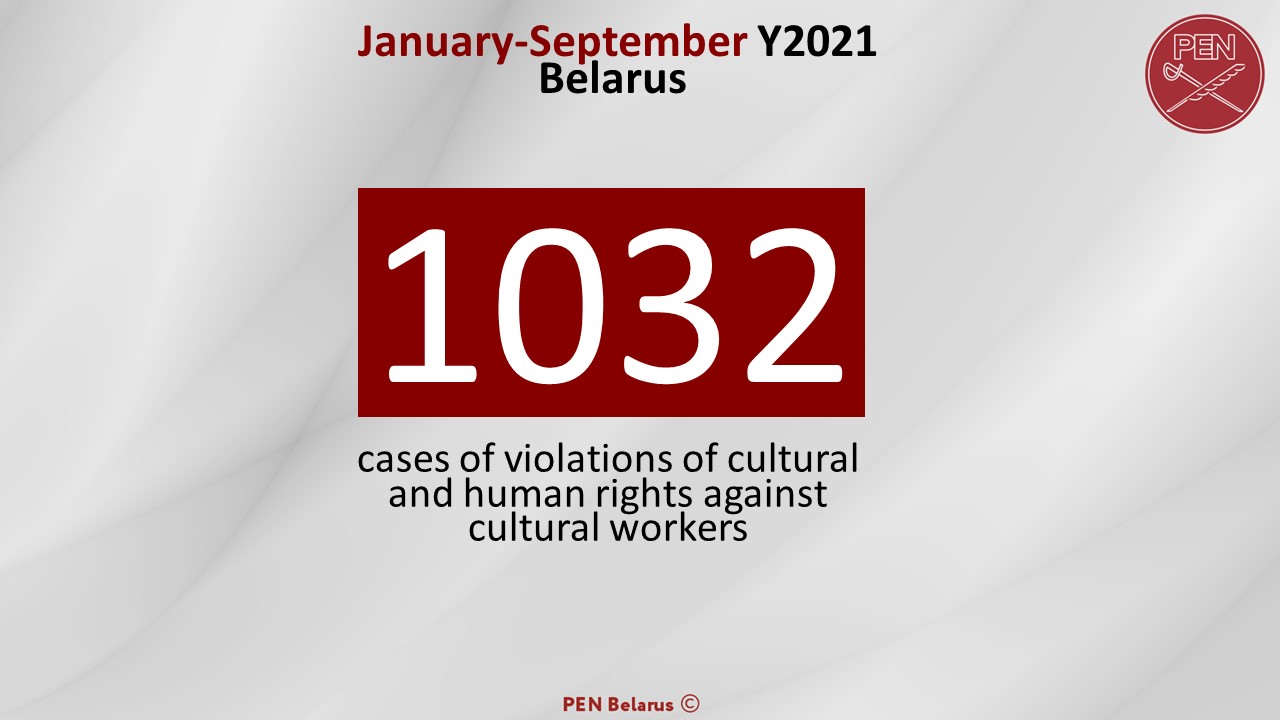
This quantity is greater than the instances recorded throughout all of 2020 (593). It is possible to state without doubt that the pressure and repression – escalated by the authorities in August 2020 – show no sign of relenting, and that they are taking new forms as well as encompassing a wider range of subjects in the Belarusian cultural sphere.
The rate of violations, from January 2020 to the present day:
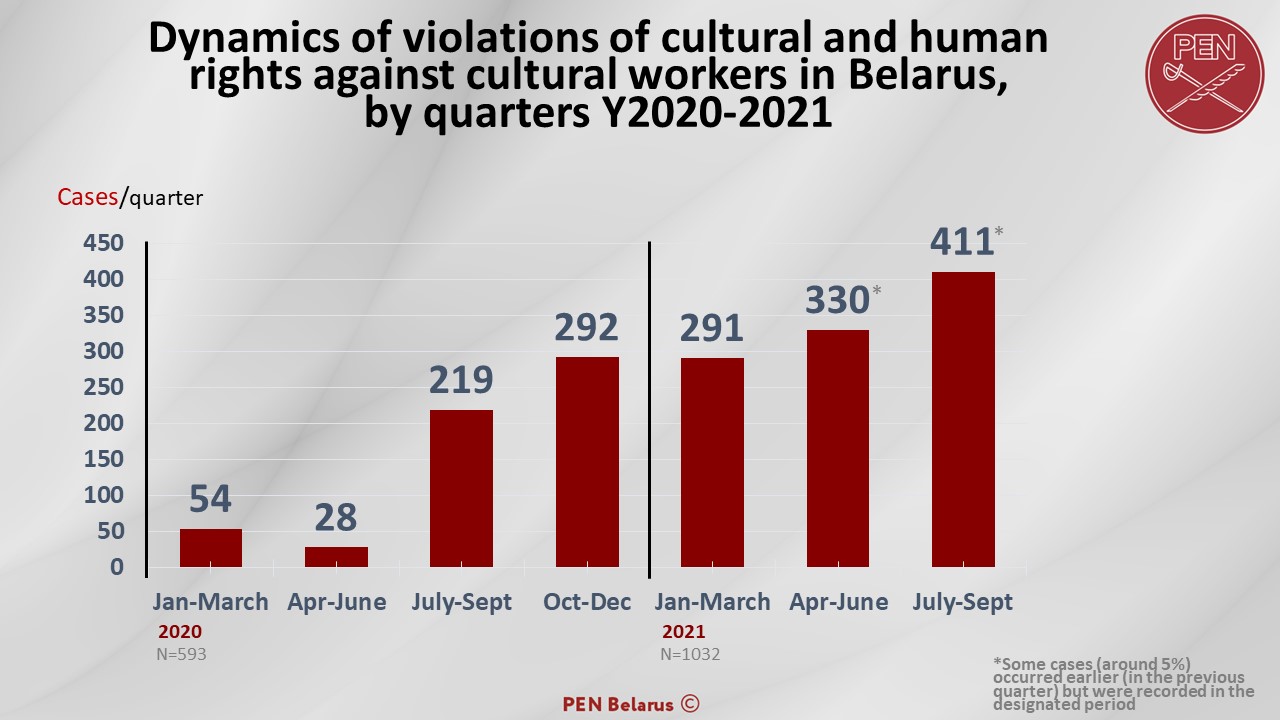
POLITICAL PRISONERS
As of September 30, 2021, 715 individuals in Belarus have been recognized as political prisoners. 60 of these are cultural workers:
- Paviel Sieviaryniec, writer and social-political activist: Sentenced to 7 years in a strict regime penal colony on May 25, 2021.
- Maksim Znak, lawyer, poet, and lyricist: Sentenced to 10 years in a strict regime penal colony on September 6, 2021.
- Philanthropist Viktar Babaryka: Sentenced to 14 years in a strict regime penal colony on July 6, 2021.
- Ihnat Sidorčyk, poet and film director Ignat Sidorchik: Sentenced to 3 years of detention in an open correctional facility (This punishment is commonly known as “khimiya”) on February 16, 2021.
- Miokola Dziadok, anarchist activist, prison literature author: On remand since November 11, 2020.
- Julija Čarniaŭskaja, writer and cultural expert: Under house arrest (forbidden from going outside or communicating with others except her lawyer) since May 20, 2021.
- Kaciaryna Andrejeva (Bachvalava), author and journalist: Sentenced to 2 years in a standard regime penal colony on February 18, 2021.
- Andrej Pačobut, poet and member of the “Polish Union in Belarus”: On remand since March 27, 2021.
- Andrej Alaksandraŭ, poet, journalist, and media manager: On remand since January 12, 2021.
- Maryja Kaleśnikava, musician and cultural project manager: Sentenced to 11 years in penal colony on September 6, 2021.
- Ihar Bancar, musician: Sentenced to 1.5 years in an open correctional facility on March 19, 2021.
- Aleksey Sanchuk, drummer: Sentenced to 6 years in a strict regime penal colony on May 13, 2021.
- Anatol Khinevich, poet and singer: Sentenced to 2.5 years in a penal colony on December 24, 2021.
- Alaksandr Vasilevič, cultural project manager and businessman: On remand since August 28, 2020.
- Eduard Babaryka, cultural manager: On remand since June 18, 2020.
- Ivan Kaniavieha, concert agency director: Sentenced to 3 years in a penal colony on February 4, 2021.
- Mia Mitkevich, cultural manager: Sentenced to 3 years in a penal colony on May 20, 2021.
- Liavon Khalatran, cultural manager: Sentenced to 2 years in an open correctional facility on February 19, 2021.
- Andżelika Borys, chair of “Polish Union of Belarus”: On remand since March 30, 2021.
- Ales Pushkin, artist: On remand since March 30, 2021.
- Siarhei Volkau, actor: Sentenced to 4 years in a strict regime penal colony on July 6, 2021.
- Danila Hancharou,, lighting designer: Sentenced to 2 years in a penal colony on July 9, 2021.
- Aliaksandr Nurdzinau, artist: Sentenced to 4 years in a strict regime penal colony on February 5, 2021.
- Uladzislau Makavetski, artist: Sentenced to 2 years in a penal colony on December 16, 2020.
- Artsiom Takarchuk, architect: Sentenced to 3.5 years in a penal colony on November 20, 2020.
- Rastsislau Stefanovich, designer and architect: Sentenced to 8 years in a strict regime penal colony on July 19, 2021.
- Maksim Taccianok, designer: Sentenced to 3 years in an open correctional facility on February 26, 2021.
- Pavel Spiryn, documentary film author and blogger: Sentenced to 4.5 years in a penal colony on February 5, 2021.
- Dzmitry Kubarau, UX-UI-Designer: Sentenced to 7 years in a strict regime penal colony on March 24, 2021.
- Ksenia Syramalot, poet and publicist, philosophy and social sciences student at Belarus State University: Sentenced to 2.5 years in a penal colony on July 16, 2021.
- Yana Arabeika and Kasia Budzko, aesthetic education faculty students at Belarus State Pedagogical University: Sentenced to 2.5 years in a penal colony on July 16, 2021.
- Maryia Kalenik, exhibition design student at the Academy of Arts: Sentenced to 2.5 years in a penal colony on July 16, 2021.
- Viktoryia Hrankouskaya, former architecture student from Belarus National Technical University: Sentenced to 2.5 years in a penal colony on July 16, 2021.
- Ihar Yarmolau and Mikalai Saseu, dancers: Sentenced to 5 years in a strict regime penal colony on June 10, 2021.
- Anastasiya Mirontsava, academy of Arts student: Sentenced to 2 years in a penal colony on April 11, 2021 in her final year.
- Sviatlana Kuprejeva (As of October 12, 2021, Sviatlana Kuprejeva was released on October 11, 2021. She spent 16 months in detention), poet, coordinator of Viktor Babariko’s team: On remand since June 11, 2020.
- Aleś Bialacki, literary critic, researcher of Belarusian literary history, essayist, and rights defender: On remand since July 14, 2021.
- Andrej Skurko, writer, musician, and author of the magazine “Nasha Istoria (Our History)”: On remand since July 8, 2021.
- Paviel Larčyk, musician: Sentenced to 3 years in a penal colony on July 9, 2021.
- Ivan Viarbicki, artist, animator: Sentenced to 8 years and 1 month in a strict regime penal colony on March 15, 2021.
- Uladzimir Mackievič, philosopher and methodologist: On remand since August 4, 2021.
- Uladzimir Kalač, Nadzieja Kalač, Piotr Marčanka, Julija Marčanka (Junickaja), Anton Šnip i Dźmitry Šymanski, musicians: On remand since August 2, 2021.
- Andrej Pietrovskij, history and social studies teacher: Sentenced to 1.5 years in a penal colony on August 25, 2021.
- Ksienija Luckina, historian, documentary film director, and journalist: On remand since August 25, 2021.
- Aleś Minaŭ, writer, Belarusian language, and literature teacher: On remand since August 25, 2021.
- Mikola Papieka, poet: Sentenced to 2 years in an open correctional facility on June 08, 2021.
- Alaksandr Bahdanaŭ, cultural manager, musician: On remand since September 2, 2021.
- Maksim Kruk, artist, scenographer: On remand since September 2, 2021.
- Artur Amiraŭ, Musician, DJ: Sentenced to 3.5 years in a strict regime penal colony on August 20, 2021.
- Dźmitry Padrez, street artist: On remand since July 15, 2021.
- Jaŭhien Piatroŭ, musician: Sentenced to 1 year in a penal colony on September 11, 2021.
- Valeryja Kaściuhova, author and editor, political scientist and analyst: On remand since June 30, 2021.
- Jaŭhien Kračkoŭski, author of the project “Adveku (From time immemorial)”: On remand since September 8, 2021.
The authorities also brought criminal proceedings against:
Volha Kałackaja, translator: Sentenced to 2 years’ detention without being sent to an open correctional facility on March 24, 2021.
Uladzimir Hundar, local history expertand activist: Sentenced to 3 years in a penal colony on May 20, 2021.
Hanna Važnik, poet and musician: Sentenced to 1 year’s detention without being sent to an open correctional facility on June 28, 2021.
Julija Laptovič, librarian: Sentenced to 3 years of detention without being sent to an open correctional facility on August 4, 2021.
Taćciana Minina, designer: Sentenced to 4 years of detention without being sent to an open correctional facility on August 12, 2021.
Ihar Alinievič, publicist, anarchist activist: On remand since October 29, 2020.
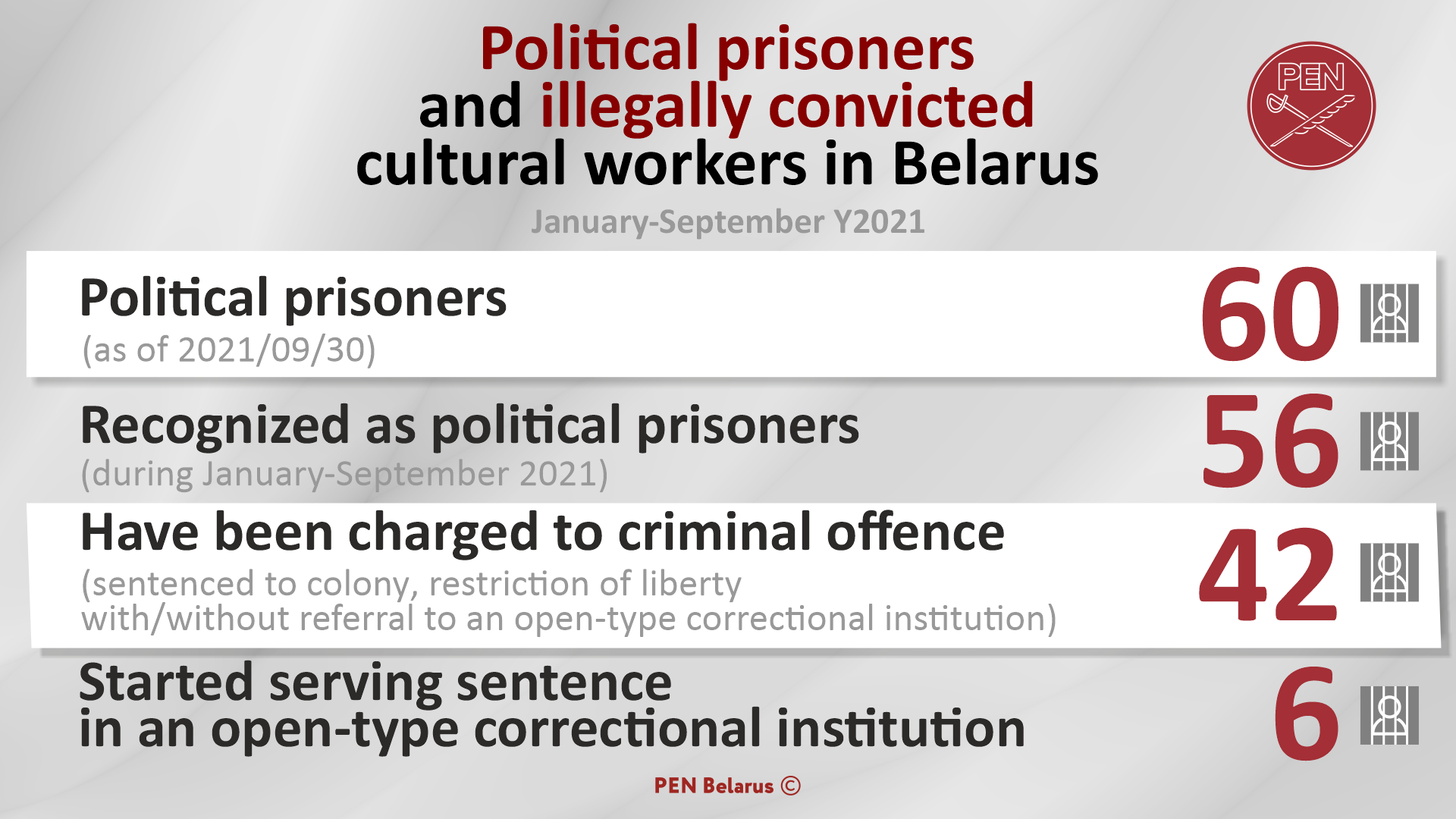
From January to September 2021, the authorities launched criminal proceedings against 42 cultural workers and delivered the following sentences:
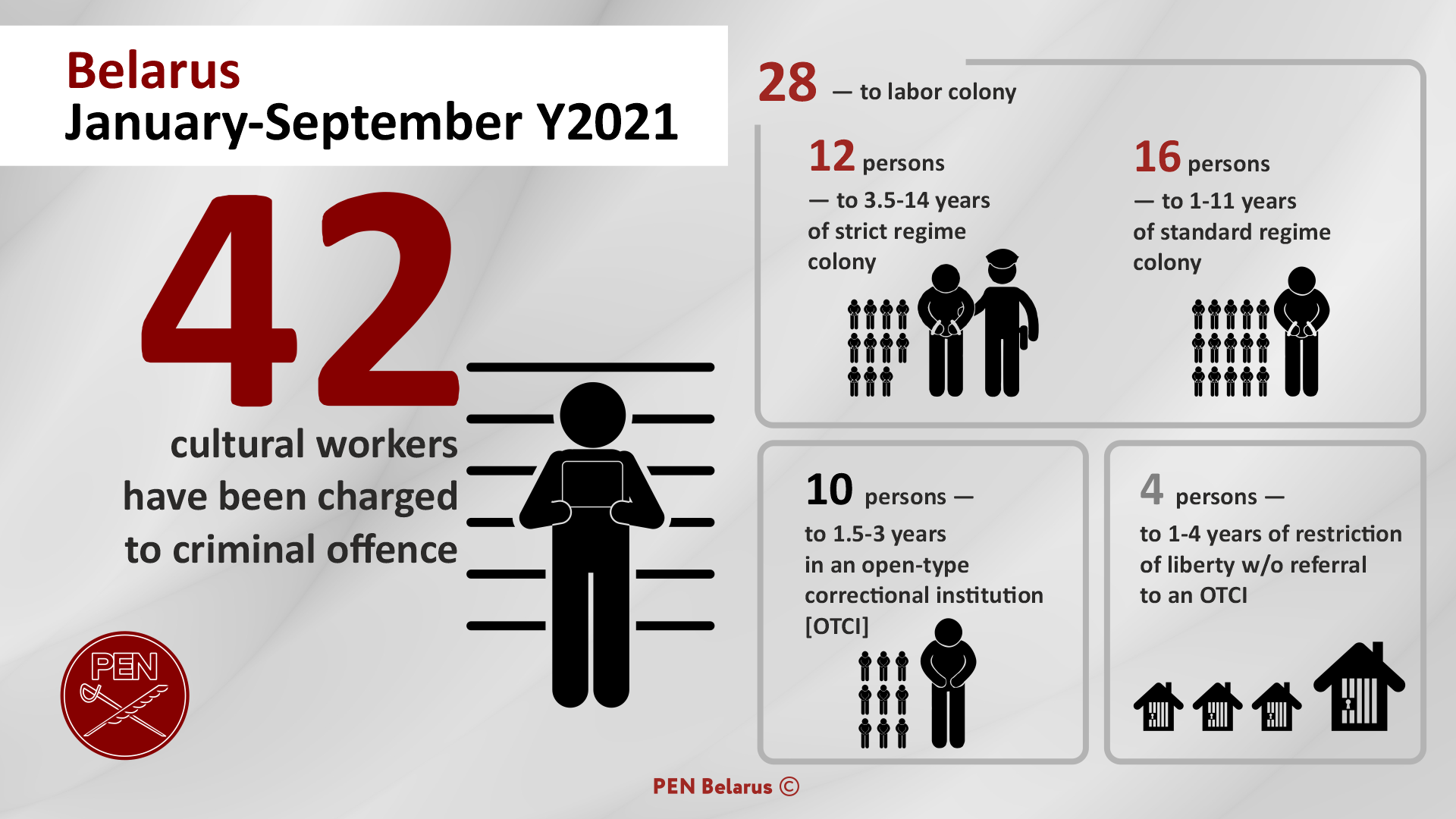
From the middle of June, the following cultural workers sentenced to open correctional facilities began their sentences: Musician Ihar Bancar, poet and film director Ihnat Sidorčyk, designer Maksim Taccianok, culture manager Liavon Khalatran, poet Mikola Papieka, musician Maksim Šaŭlinski (released in an amnesty in September), cultural manager Cimur Hazizaŭ, sentenced on September 20 to 2 years of detention in an open correctional facility but now free pending appeal.
DETENTION CONDITIONS
We continue to receive reports of draconian detention conditions that include:
- Separate wake-ups and night inspections
- The absence of mattresses
- Overcrowded cells
- A light that can burn for days
- A radio that never stops playing
- Insults from the guards
- A ban on the reception of parcels
- The absence – or delayed provision – of medical assistance
- A ban on hospital admissions
- A ban on taking necessary medication
- A ban on meetings with relatives
- A ban on doing sport (in the cell or in the breaks during work in the penal colony)
- Conditions enabling infection by coronovarius
- Placement in an isolation cell
- The registration of inmates as “prone to extremism and other destructive behaviour” that means even harsher treatment: more regular cell inspections, handcuffs during all movement, and other conditions which are regularly characterised by those who were held there as a “torture chamber” and “bestial”.
Overall, we have recorded 80 reports of the harsh and humiliating detention conditions of cultural workers.
ACCESS TO BOOKS
The access to books in detention locations merits its own analysis. We are currently recording the difficulties and insurmountable obstacles that detained individuals face in receiving books: Educational, fictional, and journalistic.
We know, for example, that:
- Viktar Babaryka does not have access to the prison library: His lawyer – Natalla Mackievič – reported this on social media. In prison colony No. 1, Navapolack, the penal colony where he is held, there is a library and inmates have the right to subscribe. However, his detention conditions are such that he does not have the opportunity to do so.
- Alaksiej Mahiloŭcaŭ – held in prison colony No. 13, Hlybokaje, – wrote that since last year it has only been possible to receive books through the prison administration – not from relatives.
- Mikita Jemialjanaŭ is held in penal colony No. 4, Mahilioŭ, a strict regime location. He decided to buy books in a retail network as permitted in the Criminal Code. Despite being law, in practice this process is almost impossible. Only after 3 months of correspondence did the Mahilioŭ ‘book seller’ send Mikita’s order to him.
- In the Homyel penal colony, Safija Małaševič was not allowed to receive French language textbooks.
- Eduard Babaryka – held on remand by the state security committee in Minsk – wrote in a letter that: “It was once again not possible to buy a book”.
- Maryja Kaleśnikava reported that: “In Žodzina, I had no books. The prison administration explained that the problem was that they feared that the books I received would contain some information – just as was the case with Lenin and information ‘written with milk’ (in invisible ink.)”
MASS LIQUIDATION OF NON-PROFIT CULTURAL ORGANIZATIONS
The third quarter of 2021 is characterised by unprecedented pressure on civil society organizations: Inspections, seizing of accounts, warnings, liquidation with and without court decision.
In the past year, officials have repeatedly made threats against civil society. On April 10, the Minister of Foreign Affairs responded to international sanctions as follows: “Any further escalation of sanctions will lead to the destruction of civil society that they [the West] care so much about. And, in my opinion, this destruction would be absolutely justified given the circumstances (Makiej on calls for sanctions).” Between July 14-17, the authorities conducted multiple raids on civil society organizations, parties, rights defenders, and independent experts. On July 22 – the day before the mass liquidation of non-profit organizations – at a meeting with the leadership of the Council of Ministers, Alyaksandar Lukashenka stated that in Belarus “for such a small country, there are almost two thousand non-governmental and non-profit organizations, gangsters and foreign agents. So what? They got their democracy? Now they look around and see that all this is harming the government! A “clean-up” is going on. You think that’s easy? Thousands of people, our people, are already working there, and most of them are crazy, brainwashed with someone else’s money (Lukashenka at a meeting with the Council of Ministers).”
On July 30, at a meeting with active local pro-regime officials, Lukashenka said,“As a result of the recent measures, we have identified 185 destructive organizations that represent a potential national security threat, including the representatives of foreign non-profit organizations, 71 republican and local associations, 113 institutions (Lukashenka at a meeting with active local pro-regime officials).”
As of September 30, 2021, the authorities are in the process of liquidating 246 civil society organizations (Liquidation and suspension of civil society organizations activity in 2021). Among these: rights defenders, journalists, educators, philanthropists, environmentalists, and others.
The “official response” to the international sanctions has also affected the cultural sphere. We have noticed a significant growth in violations regarding organizations and associations in the third quarter of 2021.
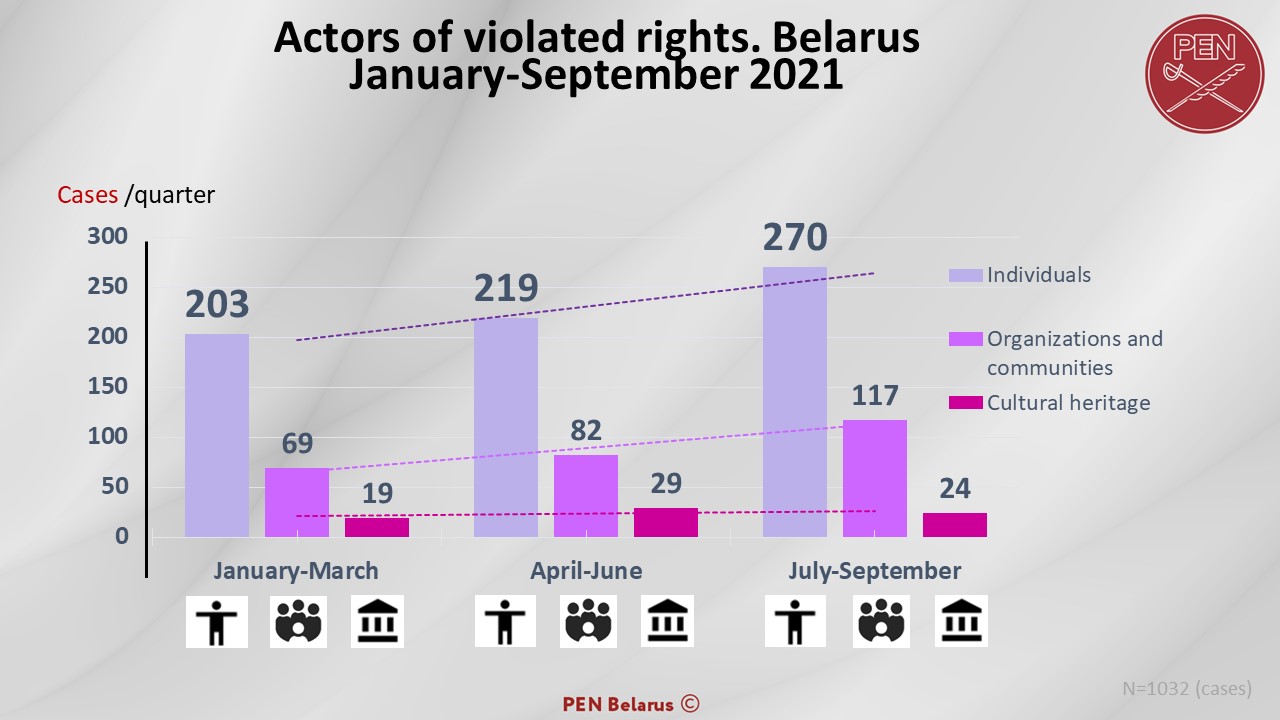
The increase in violations is a result of the “war” which the authorities launched on civil society in response to the 2020 protests and European sanctions. The pressure on the non-profit sector began in the autumn of 2020 and, at first, targeted primarily rights defending organizations: the launching of criminal cases, “searches” of funding sources, raids on offices and organization employees.The mass, unplanned inspections by the Ministry of Justice began in May 2021. In June, we recorded the first instances of violations targeting cultural organizations. The first inspections affected PEN Belarus, the Belarusian committee of the International Council on Monuments and Historical Locations, the International Belarusian Association “Fatherland”, the Union of Belarusian Writers, and others. The authorities demanded an unprecedented quantity of information and documents. After this, the Ministry of Justice unjustly liquidated the organizations through the courts. We have not seen one instance in which the courts have defended the interests of non-profit organizations. The courts unquestioningly met the demands for liquidation issued by the Ministry of Justice and regional justice departments.
We recorded the first liquidation of non-profit cultural organizations in April 2021. On April 19, the economic court of Brest Oblast ruled to liquidate the civil society organization “Polish School” against the backdrop of the campaign against the Polish minority and anti-Polish propaganda. The court stated that it made the decision “in defense of the interests of State and Society”. In May, the authorities liquidated the Hrodna-based organization “Center of City Life” with the justification that an Alyes Pushkin exhibition contained a painting violating anti-extremism laws. In June, we recorded the liquidation of the Brest-based organizations “Wings of the Serf Theatre” and the cultural-educational organization “Soil of the Future”. On June 30, the authorities demanded that the Goethe Institute and the German Academic Exchange Service (DAAD) – the world’s premier German language and culture organizations – cease their activities in Belarus. On July 1, the authorities liquidated the Brest-based regional development agency “Dzedzich”, which holds cultural festivals and events.
It has become clear that the courts do not need a reason to liquidate organizations. In some cases, the process is protracted because a trial is required. In others, the authorities simply inform organizations of their liquidation post factum. On August 9, the Supreme Court liquidated PEN Belarus – a civic organization created by eminent writers in 1989 and a member of PEN International. On August 25, 2021, the authorities informed the leader of the “Center of the Visual and Applied Arts, ART Corporation” about the liquidation process only after they had made the decision.
As of September 30, 2021, the authorities have liquidated at least 77 non-profit organizations. We see the mass liquidation manifested in the creation of administrative obstacles to the organization’s activities that impede the development of the country’s cultural sphere.
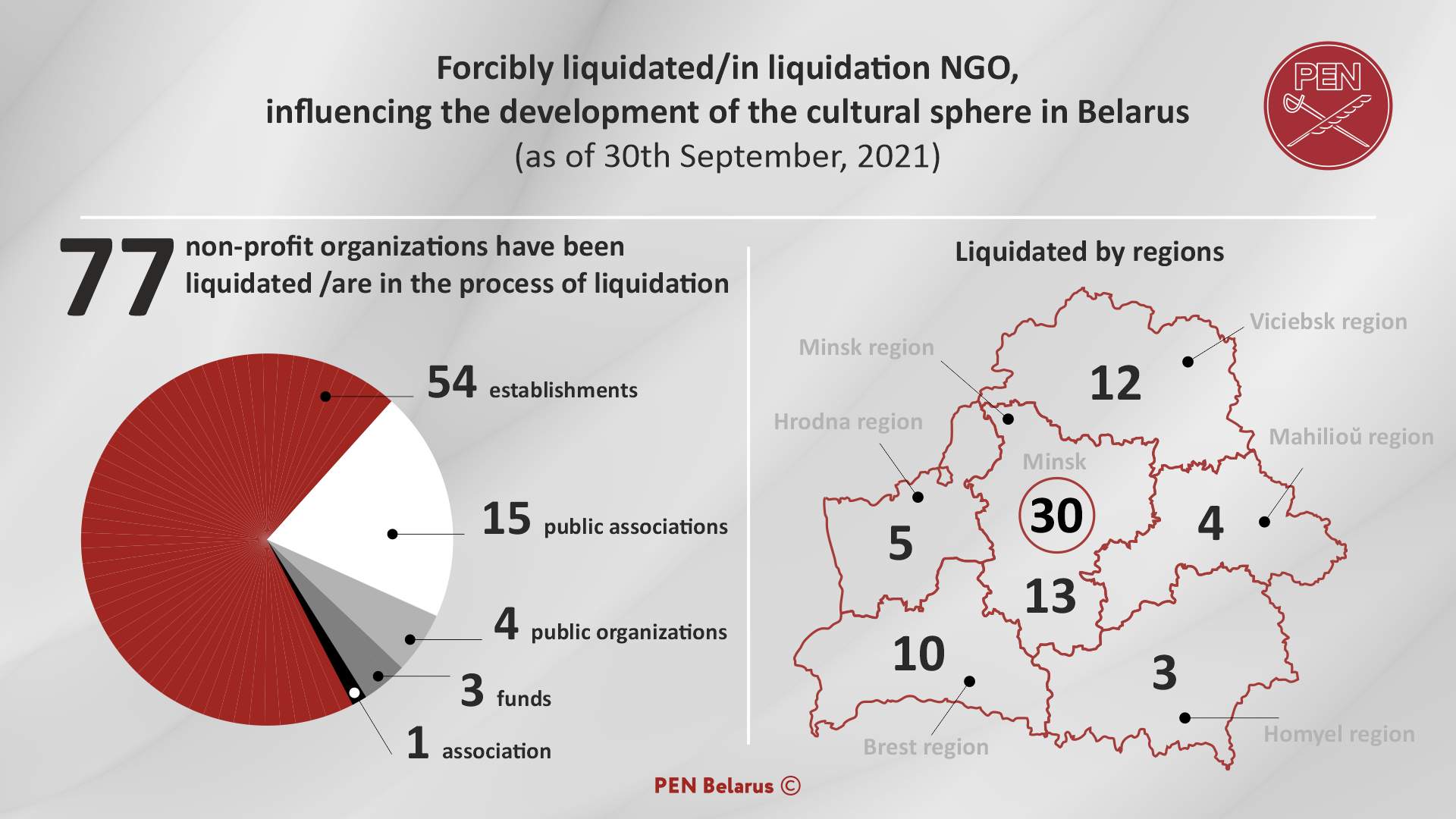
On October 1, the authorities liquidated Belarus’s most established creative organization “The Union of Belarusian Writers” – an organization created in 1934. In July, the organization received two warnings from the Ministry of Justice. On July 14, the authorities raided and confiscated technology and documents from the premises. The authorities created conditions (delay in notification letters, and blocking access to the office and documents, short deadline for submitting the requested information) such that the Union was physically unable to provide the information demanded by the Ministry of Justice. The court ruled that this was the organization’s problem. Many present in the room believe that the verdict read out by the Prosecutor had been prepared in advance.
THE STRUCTURE OF CULTURAL AND HUMAN RIGHTS VIOLATIONS TARGETING CULTURAL WORKERS
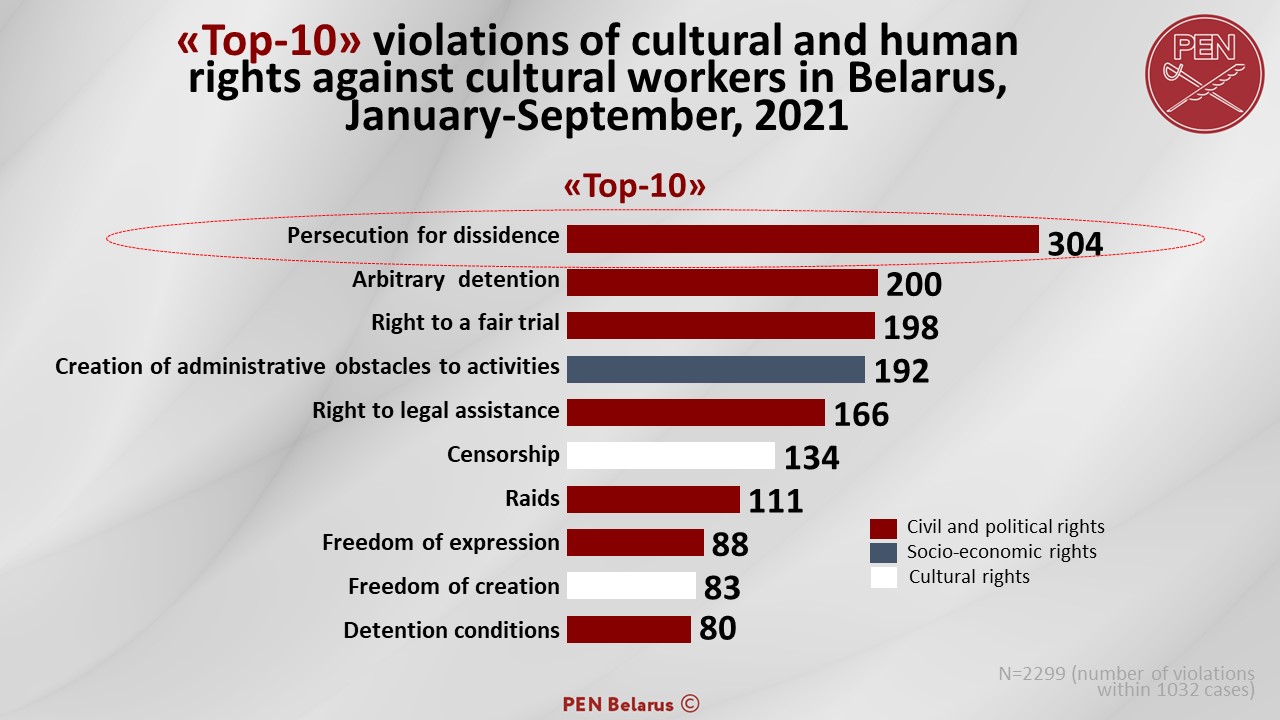
Persecution for dissent occupies first place in the “rating” of violations. The authorities have been exerting all forms of pressure upon cultural actors who express opinions different from those broadcast by state organs, from dismissal to detention and criminal proceedings. In the first 9 months of 2021, we recorded:
- 200 arbitrary detentions.
- 94 searches (111, if organization searches are counted)
- 69 criminal proceedings.
- 75 confiscations of property.
- 64 dismissals, non-extensions of contract.
- 62 instances of forced emmigration.
- Calls to interrogation, censorship, deportation, expulsion from educational institutions, special examinations when crossing the border, freezing of assets, “preventative” discussions withthe Ministry of Internal Affairs, the State Security Committee, and others.
OPPRESSIVE TRENDS
The characteristics of life in the current climate of persecution and repression are as follows:
– Self-censorship: “Group participants decided not to publish songs because they feared persecution by the authorities”, “the performance showcase was closed to the public”, the editor “conducts internal censorship regarding ‘extremism’ on all books that the organization plans to publish”, “individuals declined to participate in the festival due to security concerns”, “those remaining in the country should not share protest songs.”
– Transfer of “Belarusian cultural products” abroad: “We do not plan to hold the premiere in Belarus, “Unfortunately, we do not plan to hold screenings in Belarus”, “The Belarusian writer Viktar Marcinovič’s play ‘Revolution’ will be staged in Germany”, “The premier of the play based on Saša Filipienka’s novel ‘The Former Son’ took place in Kyiv”, etc.
– In addition to those who have left the country for personal security, cultural workers have also left the country for personal and professional actualization. In Vilnius, Hrodna Theater actors who lost their jobs staged a performance; Paviel Charłančuk left Belarus to join the Moscow-based Gubernsky Theater of Sergei Bezrukov.
– De facto ban on cultural professions in Belarus: It is practically impossible for cultural workers, particularly those dismissed from state institutions, to carry out the activities necessary for their profession.
– We are aware of another layer of repression that remains in the shadows. Cultural workers, especially those living in the regions, remain alone in facing pressure and repression without speaking of it so that they continue to work in the country, even if in a different organization than the one from which they were dismissed.
– Fear of revealing one’s identity: Many, for example, fear revealing their Polish ethnicity because of the ensuing stigmatization bolstered by the government’s anti-Polish policy.
BAN ON CULTURAL PROFESSIONS
The “ban on cultural professions” requires separate consideration. The phenomenon of “black lists” – containing musicians, writers, and other cultural workers who are practically forbidden from the free distribution of their creative products – returned to Belarus in full force in 2021. Refusal to issue touring licenses to musicians, the prohibition of autograph sessions in state bookstores for authors are among the existing forms of restrictions. Whether any of the individuals have actually seen their names on these lists remains unknown. On August 5, a pro-regime Telegram channel published a list of “undesirable” individuals. The majority of these – over 320 – were former employees of state institutions who resigned amidst the presidential elections: journalists, editors, photo correspondents, performers, actors, presenters, sportspeople, etc. 43 names were those of creative workers who had not worked for state institutions: musicians, producers, cultural managers, directors, musical collectives, etc. At least 150 of the people listed had connections to the cultural sphere. It appears that the list first arose in November 2020 but that names have constantly been added. The main message accompanying the spread of this “document” contains the message that the individuals named are “traitors” with whom it is “inappropriate to enter into working relations”. There are reports that Belarusian recruitment agencies have received letters “recommending” not to hire the listed individuals.
RESPONSIBILITY FOR COMMENTS OR “SILENCE, EVERYONE!”
The practice of holding individuals administratively or criminally responsible for social media commentary has escalated throughout 2021. The practice is widespread and systematic, and thus requires a detailed investigation.
On September 28, 2021, an IT specialist and an employee of the State Security Committee tragically passed away. Detentions of those who expressed opinions on this topic on social media occurred across the country. One week later on October 6, the authorities reported that 200 commenters had been identified, and that 136 had been detained or arrested on suspicion of “inciting social enmity and discord” and “insulting public officials and their relatives” – articles 130 and 369 of the Criminal Code. These detentions have taken place against the backdrop of the public appeal – made by the Ministry of Internal Affairs – to “concerned” citizens to send information and witness statements in order to help “identify the “scoundrels”” and “jointly punish them to the fullest extent possible.”
TRENDS THAT REQUIRE FURTHER STUDY
“Language of the enemy”
Throughout 2021, we have observed the practice of intimidation from state officials and media. We suggest that further attention should be paid to this topic.
The culture of memory and the “distortion of history”
Alongside the defamation of individuals and organizations, there has been a mass campaign to distort history: the discreditation of “undesirable” historians and symbols, as well as the falsification of historical facts and events. In 2021, we have seen the dismissal of historians who are not loyal to the regime from the Polack, Mahilioŭ, and Belarusian State universities. In August, a court sentenced a history teacher from Smorgon who explained the red and white flag to 11th grade students to 1.5 years in a penal colony. Books on military history published by “Harvest” (in particular, “Military History of Belarus: Heroes, Symbols, Lights” and “Belarusian Military Symbols: Banners and Uniforms” by Viktor Lyakhor) have been removed from libraries. Meanwhile, books of “social significance” in line with state ideology (for example, those containing the concept of ‘Polonization’ in Western Belarus and the role of Poland as an occupier) have been provided. New 11th grade history books (which authorities failed to deliver in time for the beginning of the school year) have been rewritten with the aim of discrediting the red and white symbolism as well as the “Long Live Belarus!” slogan in the eyes of senior students. The new textbook claims that this slogan is similar to the “Heil Hitler” greeting. The authorities are also implementing a campaign against Western cultural policy. In April 2021, the Prosecutor General opened a criminal case regarding the supposed genocide of Belarusians during the Second World War according to Homyel historian and fine arts studies candidate Jaŭhien Malikaŭ [Evgeny Malikov]. These accusations against an abstract concept of ‘the West’ are ideological constructions designed to distract attention from the crimes committed by the State since August 2020 (The resource was recognized as extremist on June 8, 2021 and cannot be displayed).”
NEW FACTS AND LOSSES IN THE CULTURAL SPHERE
⇒ The following cultural products have been deemed ‘extremist’
- “Belarusian Donbas” by Kaciaryna Andrejeva (Bachvalava) and Ihar Iljaš.
- “The Belarusian National idea”
- The clip of the song “Baju-Bye”.
⇒ Works by the following authors have been excluded from the 11th grade literature syllabus:
- Sviatlana Aleksijevič.
- Aleksandr Solzhenitsyn.
- Vladimir Nabokov.
Previously, the works of Solzhenitsyn and Nabokov fell under the “dissident literature” category. In the category “Prose: Man and War”, Aleksijevič’s works have been replaced by those of the pro-regime author Mikalaj Čarhiniec.
⇒ By the end of 2021, the authorities plan to decrease the number of cultural workers by 20% (National Anti-Crisis Management: it is planned to lay off every fifth cultural worker by the end of the year) (there are currently 65.5 thousand people in the sector). The Ministry of Culture says that this move represents the “optimization of the number of cultural organizations and the reduction of staff.” In September, the Belarusian State University for Culture and the Arts liquidated (restructured) the Ethnology and Folklore faculty, which had existed for 20 years.
WE ARE CONTINUING TO RECORD:
⮚ Discrimiantion against the Belarusian language.
⮚ The discreditation of cultural workers by state media.
⮚ The launching of administrative and criminal cases against those who use national symbols (the red and white flag, the ‘Pahonia [Pursuit]’ coat of arms) and who come up with creative variations of these historically symbolic colours. We alone have recorded more than 450 instances of this in 2021 across the country.
⮚ The launching of administrative and criminal cases against those who participate in protest and solidarity actions.
